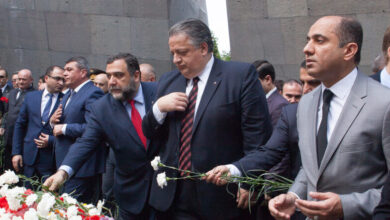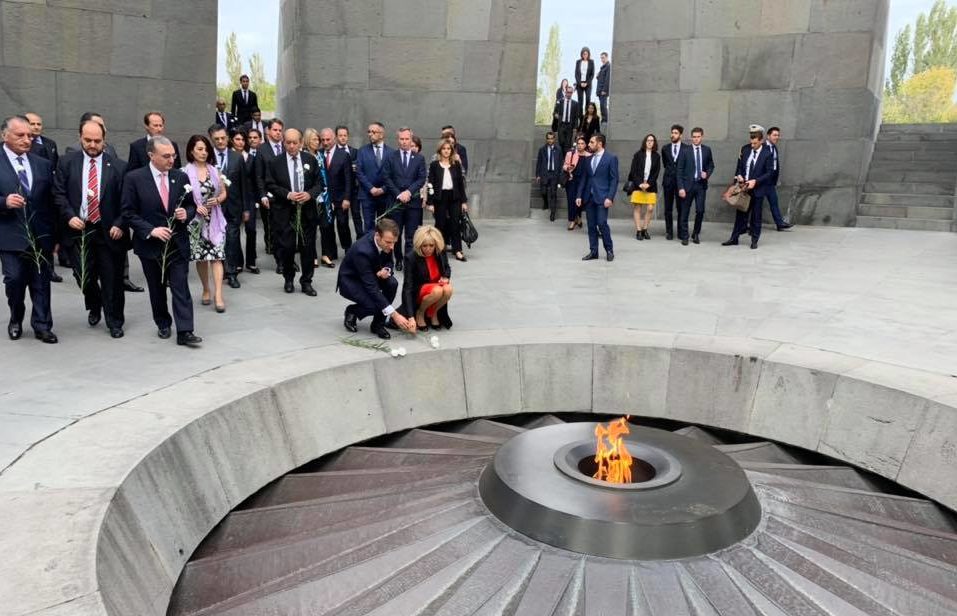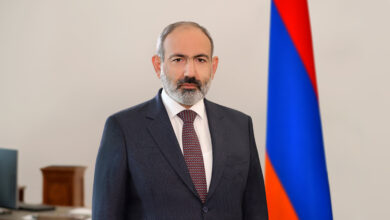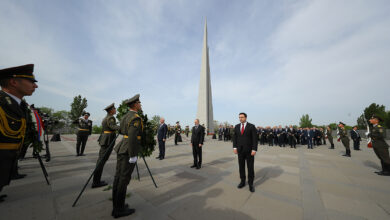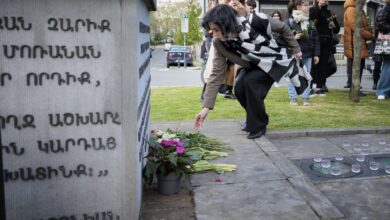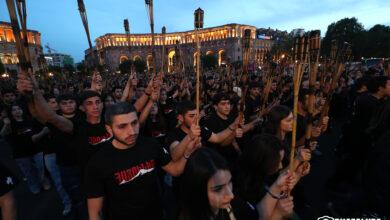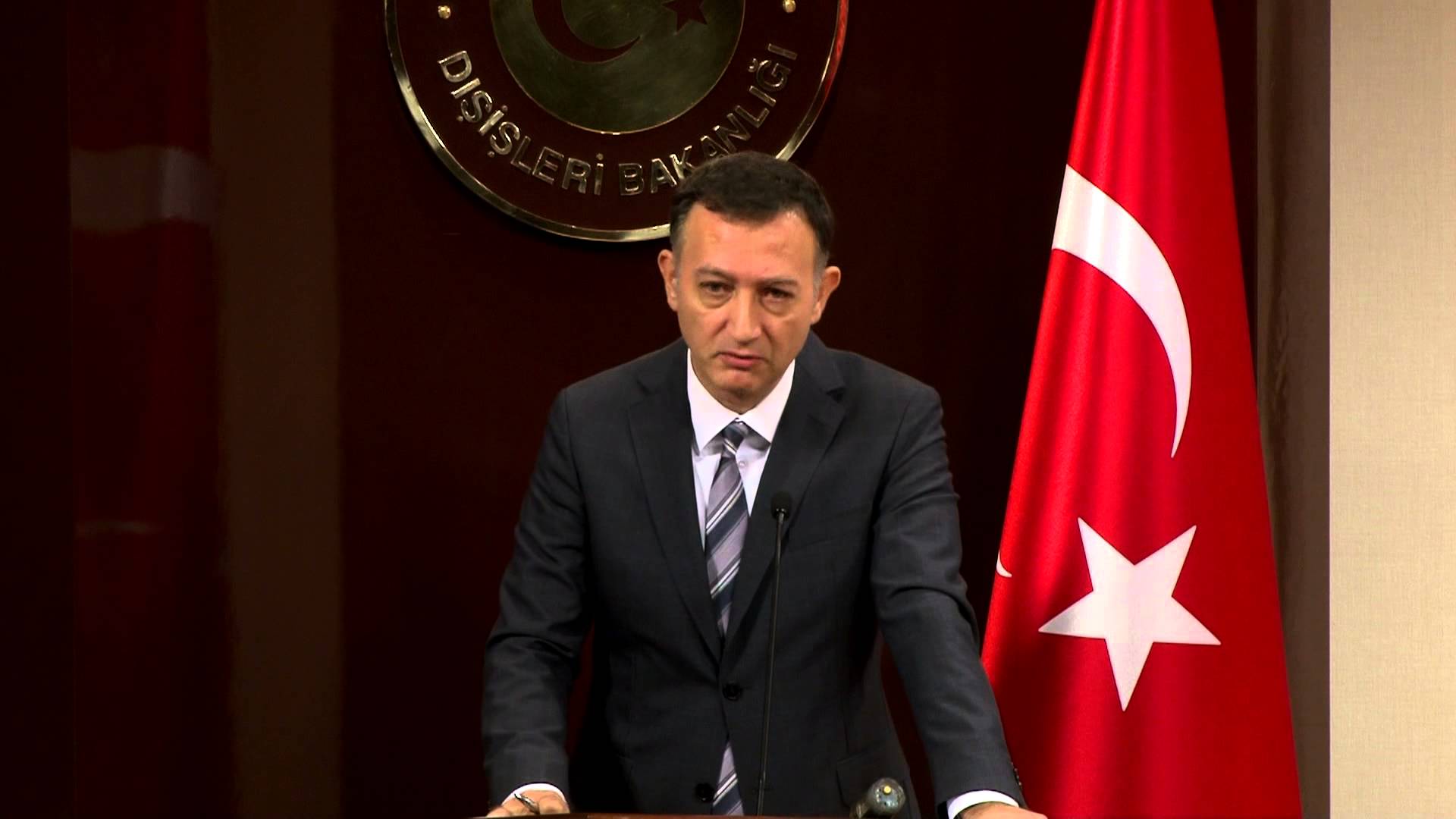
In an exclusive interview with the Public Radio of Armenia, Turkish Ambassador to Georgia Zeki Levent Gumrukcu talks about Turkish Prime Minister Recep Tayyip Erdogan’s statement issued on the eve of the Armenian Genocide anniversary, the Armenian-Turkish relations and the ways to move on, the two protocols pending in the parliament and the Nagorno Karabakh issue.
Gita Elibekyan, Siranush Ghazanchyan
Public Radio of Armenia
Tbilisi-Yerevan
On the eve of April 24 Turkish Prime Minister Recep Tayyip Erdogan issued a message on “the events of 1915” in several languages. Who was the message addressed to?
The message was addressed first and foremost to the Armenian population worldwide, not only in Turkey and Armenia, but to the Armenians all over the world. This was the first time that a Turkish Prime Minister addressed the Armenian population directly on this issue. As such, the message was truly of historic nature. Because, so far there have been several contacts between the Turkish and Armenian authorities and we have also exchanged views through media and intermediaries. But that was the first time a Turkish Prime Minister decided to address the Armenian population directly and tell them how we feel about the events of 1915.
I think the message was addressed particularly to those who lost their beloved ones in 1915 during the relocation. In this regard, the key elements of the message are that we recognize the inhumane consequences of the relocation of 1915, we share the grief, pain and suffering of the Armenian population as a whole and that we express condolences to the children and grandchildren of those who lost their lives during those events. So they were a particularly important target audience of the message.
The message was also addressed to those who want a better future for Armenia, for Turkey and for the people of this region. In this context, the message stressed our commonalities and our special relations dating back to history. And based on this very special relationship, the message has been focused on the future, encouraging us to work together to build a better and common future.
Why was Erdogan’s message issued now?
I think the Prime Minister realized that not addressing the Armenian population directly was giving certain third parties a chance to exploit the relationship between us for their own agendas. So I think that’s why he thought it’s time now for him to address the Armenian population directly and tell them what we stand for, what we think about our past, our present, but most importantly, our common future. In other words, we thought that the more we don’t have this direct communication, the longer our relationship will be based on misunderstandings and prejudices. Therefore, the Prime Minister decided to dispel this kind of considerations and address the Armenian population directly. I think it was well received worldwide.
The reason why it was issued on April 23rd is because we know that on April 24 the Armenians remember the events of 1915 worldwide. It was probably thought that it would be better to make such a communication right before April 24, when everyone was focusing and trying to remember what happened in 1915.
Speaking on US broadcaster PBS, PM Erdogan declared that the fact of Armenians living in Turkey today is a proof that there was no genocide. Does the presence of Jews in Germany prove there was no Holocaust?
I don’t think it’s good to draw parallels between different events. What PM Erdogan meant was that there has never been hatred against Armenians on the part of the Turkish people. On the contrary, Armenians have always had a very high standing in Turkey that goes all the way back to the Ottoman Empire. But even today there is a growing number of Armenians coming to Turkey, working in Turkey, having very good relations with their Turkish neighbors in Turkey.
For genocide to occur, there has to be a deliberate act to eradicate a certain group of people based on their ethnicity or faith, etc. What the Prime Minister meant is that there has never been such a negative relationship, such an antagonism between Turks and Armenians. Today the fact that we see Armenians in increasing numbers coming to Turkey, working with their Turkish counterparts shows that this is not the case now either. And I think that in the future if we manage to normalize our relations, the two peoples will further benefit from this deep-rooted relationship.
Turkey closed the border with Armenia in 1993, which was actually a hostile action against our country. Does Turkey consider Armenia and Armenians as enemies?
No, of course not. In fact, in Turkey we don’t consider anyone as our enemies. Our Foreign Minister Ahmet Davutoglu said once that Turkey has only friends and potential friends. Even with those who we don’t have good relations with now, we will do everything possible to improve our relations in the future in order to make them our friends. This is the general outlook of our foreign policy. But particularly, we don’t see Armenians as our enemies.
The reason for the closure of the border between Turkey and Armenia was the conflict between Azerbaijan and Armenia, and the occupation of the Azerbaijani territories by Armenia. But since then we have kept the channels of communication open between Turkey and Armenia. In 2009 we even reached the level where we signed protocols on normalization of our relations, which had not only envisaged the establishment of diplomatic relations, but also the opening of borders. So, based on certain requirements and a process to be followed, we are very much ready to open the borders, establish diplomatic ties and normalize our relations in general with Armenia.
Given that the conflict between Azerbaijan and Armenia was the reason why we had to close our borders with Armenia in 1993, we’re also trying to contribute to the resolution of the Nagorno Karabakh conflict. In this regard, we are a member of the Minsk Group. We’re not the one of the Co-Chairs of this group, but we are an active member of it, and we are always trying to help resolve this issue peacefully sooner rather than later. Of course, we’re in close touch with Azerbaijan, but we’re also trying to talk about this issue to Armenia, because the resolution of this conflict will certainly open new avenues of cooperation and will help us realize the potential of our region in a much better way.
In today’s relations with Armenia Turkey constantly brings forward the Karabakh issue and the Khojalu tragedy. Before the events in Khojalu Armenians were massacred in different settlements of Azerbaijan – Sumgayit, Baku, Kirovabad, Getashen, Martunashen and Maragha, but Turkey prefers to keep silent about this. What standards does Turkey use to assess which nation has the right to live and which one is to be annihilated?
Turkey in principle is against any aggression towards innocent people anywhere in the world. There is no doubt about that. But the conflict between Armenia and Azerbaijan has a long history. Today, when you look at the region, you see that the Azerbaijani territorial integrity is still being violated. Not only Nagorno Karabakh, but also 20% of the Azerbaijan proper, the seven regions around Nagorno Karabakh, is under the occupation of the Armenians. I think that is something we need to redress through the efforts of the Minsk Group and resolve this issue peacefully. After 20 years, what needs to be done now is to accelerate this process and resolve this conflict as soon as possible, because, as I have said, its resolution is definitely going to make us realize the true potential of our region.
For instance, you know how Turkey, Georgia and Azerbaijan are benefiting greatly because of the trilateral cooperation they enjoy. There is no reason why Armenia should not be a part of this. We have started this trilateral cooperation as a core of a larger regional cooperation and we definitely want Armenia to be a part of it, contributing to and benefiting from such cooperation. But in order to do it, we first need to resolve the conflict between Azerbaijan and Armenia and normalize relations between Turkey and Armenia. And when we do that, we’ll see that this part of the world, the Caucasus, has a great potential for not only its inhabitants but much more widely, particularly given the energy and transport characteristics of the countries of the region.
How do you assess the fact that Turkey closed its border with Armenia because of a third country, although it has always been declaring that it wants peace and stability in the region?
Armenia and Azerbaijan are neighbors, and when we see one country occupying certain parts of another country, we cannot just remain indifferent to that. Moreover, given the special relationship between Turkey and Azerbaijan, we felt that we had to react. In the beginning we have done a lot to stop this aggression and to find a way of dialogue and an agreement between the two countries. But unfortunately that wasn’t possible then. So that’s why we decided to close our borders. But since then we’re trying to help the two countries resolve this conflict with the contribution of the international community and particularly the Minsk Group.
But when it comes to whether this is a precondition for the normalization between Turkey and Armenia, no it’s not a precondition. But we need to see that the resolution of conflicts in this region is part of a larger regional perspective of peace. If you want to make progress in one piece of this puzzle in a lasting and sustainable way, you have to keep an eye on the other aspects of regional dynamics. That’s why we’re saying that Turkish-Armenian normalization has to go hand in hand with the resolution of other conflicts, first and foremost the conflict between Azerbaijan and Armenia. Positive steps in one or the other have to be mutually reinforcing. That’s what we want to do. The steps towards normalizing the relations between Turkey and Armenia must help the resolution of the conflict between Armenia and Azerbaijan, and those positive steps on that front should help the normalization between Turkey and Armenia. Only then we can build a regional perspective of peace, where everyone will enjoy the dividends of peace. Without making it a precondition, we think that it is more practical and more realistic way to look into these two issues in parallel with each other and try to create a mutually reinforcing relationship between the two.
And that’s exactly what we are doing. This is also why we are coming up with some creative new formulas and ideas all the time. For example, I was in Yerevan in December with my Minister and we had a long talk with Minister Nalbandian. We considered certain ideas on how to revitalize the process of normalization between Turkey and Armenia in a way that will be mutually reinforcing with the efforts to resolve the Armenian-Azerbaijani conflict. I think that’s the right way to go, and we will continue to work in that direction.
In 2009 Armenia and Turkey signed two protocols in Zurich. When will the Turkish Parliament ratify the documents?
The protocols are still at the parliament waiting for ratification. There has to be a certain process for that. But we all know why the ratification process has not been completed at the time of the signing in 2009. Because shortly after the signing of the documents the Armenian Constitutional Court issued a statement about the protocols, where it created a completely new context, which was against the word and spirit of the protocols. It somewhat divided the protocols into pieces, and decoupled certain parts from its entirety. What you and we understand from the protocols became too different from each other. That’s why we were not able to go on with the ratification given that sort of differences in their interpretation.
Furthermore, as I said, we’ve always believed that the protocols and the normalization of relations between Turkey and Armenia is part of a larger regional context, and that the normalization of Turkish-Armenian relations has to go hand in hand with the resolution of other conflicts in a mutually reinforcing manner. This is also the reason why we are somewhat delayed in the ratification and moving ahead with the normalization of relations.
But again, it’s not a precondition. I’m underlining it once again that it is just a practical concern that Turkish-Armenian normalization is part of a larger regional context. In order to make it a sustainable process, in order to make it contribute to the regional peace and stability, we need to keep an eye on other issues that are affecting regional peace like the Azerbaijan-Armenia conflict. So, I think first and foremost we need to create such a dynamic, such a framework, where the two issues will mutually reinforce each other. One step in one front should yield positive results in the other. So that is the kind of framework we’re trying to create, and we are committed to do that in the future as well.
It is in this framework that we are still committed to the normalization of relations and to the ratification of the protocols. However, for that we need to work closely with Armenia. We need to talk, we need to see what sort of issues are keeping us from going in that direction faster. I think that by talking and by engaging in a meaningful dialogue with Armenia we might make some progress in that direction. In fact, that’s why my Minister traveled to Armenia in December and talked to his counterpart Mr. Nalbandian in the margins of the Black Sea Economic Cooperation Organization meeting. And I think that in the future if we are able to continue that dialogue, if we are able to understand each other, we will be able to come closer to the ratification of protocols and normalization of relations between Turkey and Armenia.
Armenian President Serzh Sargsyan recently invited the Turkish leader to visit Armenia on April 24, 2015, the 100th anniversary of the Armenian Genocide. Do you think the Turkish President will accept the invitation?
Let me not comment on this before I see the statement in its entirety. Maybe, we’ll talk about it later on. But based on our positions on the events of 1915, I think first and foremost we need to have a dialogue between our governments, historians and peoples to understand how we both see that particular part of our history. Rather than imposing our memories on each other, we have to work in order to come up with a just and common memory.
That’s the reason why in fact Turkey has long time ago proposed to establish a joint commission of historians to study that particular period in history and to shed light on this chapter of our common history. But unfortunately, so far we haven’t had a positive response from the Armenian side about that proposal. I think that this is a must. If we are to agree on how we view our past, we need to get together and have an open dialogue.
To this end the Turkish side has also opened its archives in its fullest extent. Now, anybody, an Armenian researcher or researchers from all over the world can come to Turkey, can go to our archives and can look at each and every document from that particular period. We believe that Armenia should also open its archives. The third parties – Russia, US, UK, Germany, France – who have documents that can shed light on that particular era, should also do the same.
Only through such a dialogue and joint study we can establish the facts and reach a common and just memory without imposing our own memories upon each other. This is why our Prime Minister’s message has made quite an important stress on this particular matter. We expect the Armenian side to positively respond to our proposal for a joint historical commission, so that we might start working on this project sooner rather than later.
Would you like to add anything?
I think that Prime Minister Erdogan’s message has to be analyzed very carefully. As I said it is truly of historic nature that a Turkish Prime Minister for the very first time addressed the Armenian population directly on the issue of the events of 1915. So I think that rather than seeing it as a tactical move, one has to read it without any prejudice. I would just humbly appeal to all my Armenian friends and colleagues to read that message carefully and to see what it really means, what it really tries to get across to the Armenian people. And based on this I believe we can indeed establish a very meaningful and promising dialogue, which Turkey is definitely ready to be engaged in.



